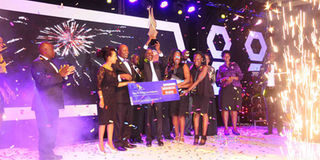Low competitiveness retards Uganda’s economy, BoU says

Rayna Uganda Limited chief executive officer Lawrence Okumu (hoisting plaque) joined by his wife Christine Okumu to receive their winning plaque from Bank of Uganda deputy governor, Louis Kasekende, and a dummy business class air ticket to South Africa from South African Airways country manager Yogi Birigwa. PHOTO BY STEPHEN OTAGE
What you need to know:
- If this sector is to expand to command a much larger share of the Uganda economy, thousands of new mid-sized companies will have to invest in Uganda.
- To attract private investment on such a scale, long term growth in markets for goods and services, macroeconomic stability and competitively priced work force should be in place.
Kampala. Bank of Uganda deputy governor Louis Kasekende has said hindrances of competitiveness of Uganda’s economy are major barriers to investment in the modern business sector.
Mr Kasekende was quoting the 2017 Global Competitiveness Report during the Top 100 mid-sized companies survey awards gala dinner held at Hotel Africana, Friday night.
The report says the competitiveness of Uganda’s economy is affected by institutional aspects such as public administration, poor infrastructure, higher education and training as well as technological readiness.
The deputy governor’s remarks came after the bank’s 2016 annual Private Sector Investment Survey (PSIS) of 630 companies, which concluded that the companies make up only 5 per cent of the country’s Gross Domestic Product (GDP)
“Although these companies have achieved robust productivity growth, their share of the economy is too small to make a substantial impact on that of the economy as a whole,” he said adding that: “If this sector is to expand to command a much larger share of the Uganda economy, which is necessary if per capita incomes are to rise substantially, thousands of new mid-sized companies will have to invest in Uganda.”
In addition, he said to attract private investment on such a scale, long term growth in markets for goods and services, macroeconomic stability and competitively priced work force should be in place.
He also asked that events such as the gala awards stimulate debate on public policies such as appropriate tax rates to strengthen the business environment.
The 2017 top 100 mid-sized companies survey released results last week showing that 74 per cent of the companies complained of high taxation as a constraint to productive business.
The KPMG, Daily Monitor survey, in its 9th year, climaxed on Friday with Rayna Uganda Limited as the overall winner, taking home the Pinnacle Award. The company’s chief executive officer, Mr Lawrence Okumu revealed that they started with Shs1m but are currently worth Shs27b.
“As a company, we are systematic and do timely deliveries to retain our customers and boost our market,” he said.
Rayna, along with other winners, TM Foodland Uganda limited, Multilines and Blue Cruise in the 2nd, 3rd and 4th position consecutively, walked away with free air tickets by sponsor, South African Airways as a move to boost networking and international exposure for their businesses.
The other sponsors of the survey were dfcu Bank, Insurance Company of East Africa, Uganda Investment Authority and Vodafone Uganda.
Club 101 newest entrant
Club 101 comprises companies that have hit or gone above the Shs25b turnover and every year, a company from the survey gets initiated into the group. This year, Harree Hardware Uganda Limited is the new graduand. With 12 employees and having participated for five years in the survey, Harree has made it into club 101. The company’s managing director, Mr Mukesh Vaghjiyani said they have boosted their annual turnover 14 times more than when they were not part of the top 100 mid-sized company survey.
“We are happy to have joined the Club 101. We have been in this survey for five years now and before the survey, we used to make Shs4.5b, last year we increased to Shs36b and this year we have made Shs57b,” he said.
Turn over
Threshold. More than 70 per cent of the companies covered by the Private Sector Investment Survey had an annual turnover within the thresholds for defining a mid-sized company for the purposes of the KPMG Gala awards (Shs360m to Shs25b).




